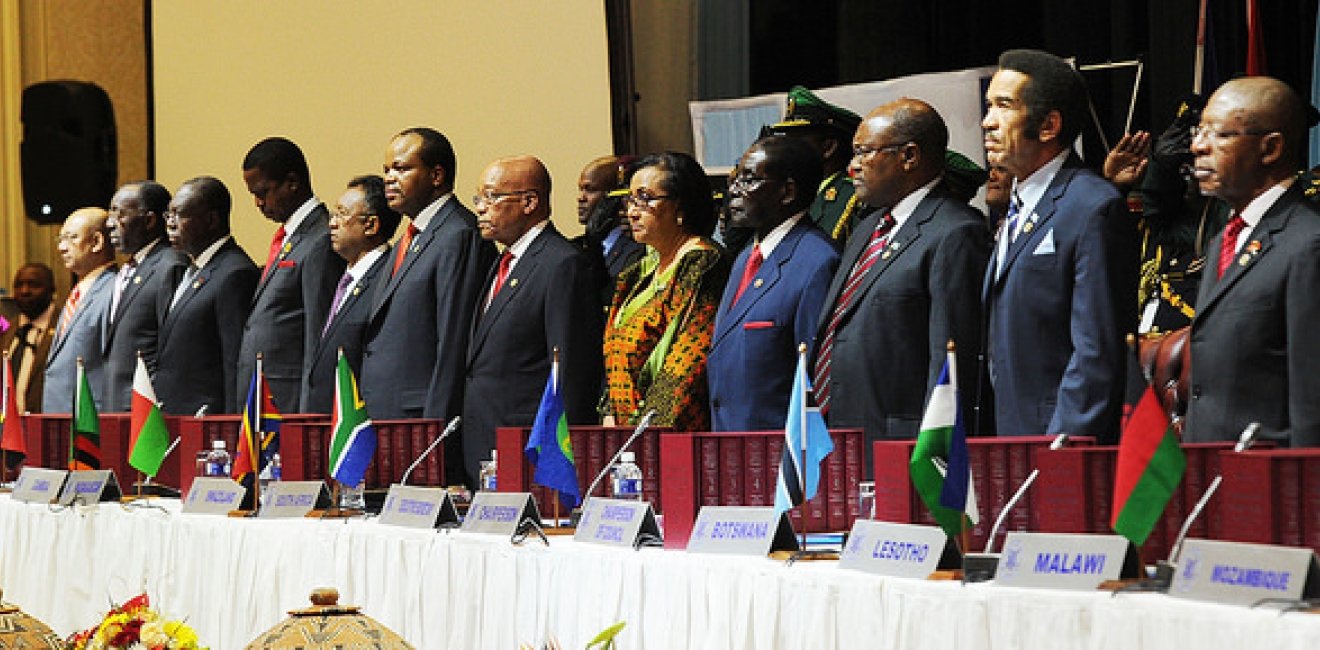
A blog of the Africa Program
[caption id="attachment_10831" align="aligncenter" width="640"] Heads of state of SADC member countries gather in Gaborone, Botswana in August 2015. Photo by GovernmentZA via Flickr. Creative Commons.[/caption]
On June 24th, the people of the United Kingdom voted to leave the European Union (EU). While much of the aftermath of Brexit remains to unfold, it's clear that the European project has been dealt its most significant blow yet. But while the EU falters, Africa has taken up the torch of regional integration. Significant strides toward integration have been made at both regional and continental levels. Many African policymakers see integration as a winning proposition for their countries that improves trade, increases market size, strengthens political and economic institutions, enhances export competitiveness, and improves efficiency gains. While much can be learned from both the failures and significant successes of the EU, African integration faces its own unique problems.
African leaders have long had an interest in political and economic integration, going back to the establishment of the Organization of African Unity in 1963, now the African Union (AU). Today, the AU remains a major actor for regional integration: he AU Strategic Plan for 2009–2012 recommended the establishment of free trade areas and a customs union as a primary step toward a continent-wide African Economic Community. The AU Strategic Plan for 2014–2017 reaffirmed a commitment to these daunting goals and proposed building institutional and human capacity to achieve them. A more recent effort has been a plan to introduce an African passport later this year to enable the easy movement of African officials within the continent, as well as an end to visa requirements for all African citizens by 2018. The African Union identified and acknowledged eight Regional Economic Communities (RECs) as the main institutions to drive the formation of a continent-wide "United States of Africa" by 2063. These RECs — ECOWAS, AMU, COMESA, CEN – SAD, IGAD, EAC, ECCAS, and SADC — have helped to enhance regional integration to varying extents in Africa. The EAC and ECOWAS have taken proactive steps toward trade facilitation; they have each established customs unions and common markets and are gradually moving toward common monetary unions. Another important step in trade facilitation on the continent was the launch of a Tripartite Free Trade Agreement, comprising the 27 countries of COMESA, SADC, and the EAC, which will come into force by the end of 2016. The EAC, ECOWAS, and SADC lead the pack in terms of deepening inter-regional trade.
As promising as RECs may seem in the quest to deepen regional integration, they are not without their fair share of challenges. There are too many RECs, and overlapping regional blocs undermine integration. They often lack a clear policy direction and have weak institutional capacities to actually carry out meaningful integration. Military and political tensions between members of a REC can also derail efforts at integration: the incessant conflicts in the Horn of Africa affect stability in the EAC, and the political crises in the SADC region slow efforts toward integration, to mention a few. Moreover, political elites are not prepared to give up sovereignty and power; an issue that frustrates all the RECs one way or another.
Secondly, Africa trades very little with itself. For instance, the share of intra-regional goods trade in total goods imports is only around 5 percent in COMESA and 10 percent in ECOWAS. This compares unfavorably with over 20 percent in the Association of Southeast Asian Nations (ASEAN), around 35 percent in the North American Free Trade Agreement (NAFTA), and more than 60 percent in the European Union. At the continental level, European exports to other European countries reached 69 percent. In Asia the corresponding figure stood at 52 percent and in North America at 50 percent. Africa, by comparison, had the lowest level of intra-regional trade, at only 18 percent — perhaps a reflection of its integration process. Africa is not achieving its potential in regional trade — a fact that is catastrophic to its integration process.
Overcoming these bottlenecks looks overwhelming, but it is not impossible. There is nothing wrong with duplicating what has already been done; despite the significant problems that led to 17 million Brits voting to leave, the EU has seen a great deal of success in transforming Europe and again making it a major political and economic player on the world stage. African policymakers can get the integration process right by learning from what has (and hasn't) worked for the EU and tailoring it to the unique needs of an African Economic Community. Most important is learning from the EU procedures toward achieving pooled sovereignty; this will be necessary for deeper integration in Africa. Nonetheless to achieve this, integration within the RECs will need to be deepened as far as is feasible. It is imperative for Africa to strengthen the RECs toward the actualization of the African Economic Community. The economic blocs need to be consolidated, standards need to be harmonized, free trade Areas need to be built, intra-regional goods trade needs to improve, and improved infrastructure to enhance regional and global trade will need to be put in place. The galvanizing effect of all these will be the need to deepen democratic governance in Africa. Overall, Africa must first ensure that the RECs work effectively. Besides, as the old adage says, "If you want to integrate globally, you need to integrate regionally."
Looking forward, a deeper integration path will enhance regional markets, lower transaction costs for regional and global trade, improve economies of scale, and minimize the constraints faced by firms in gaining access to services and skills on the African continent.
George Boateng is a Southern Voices Network scholar at the Wilson Center from April to June 2016. He is a research analyst at the African Center for Economic Transformation (ACET), a member of the Southern Voices Network.
Author

Research Analyst, African Center for Economic Transformation

Africa Program
The Africa Program works to address the most critical issues facing Africa and US-Africa relations, build mutually beneficial US-Africa relations, and enhance knowledge and understanding about Africa in the United States. The Program achieves its mission through in-depth research and analyses, public discussion, working groups, and briefings that bring together policymakers, practitioners, and subject matter experts to analyze and offer practical options for tackling key challenges in Africa and in US-Africa relations. Read more

Explore More in Africa Up Close
Browse Africa Up Close
The Innovative Landscape of African Sovereign Wealth Funds



